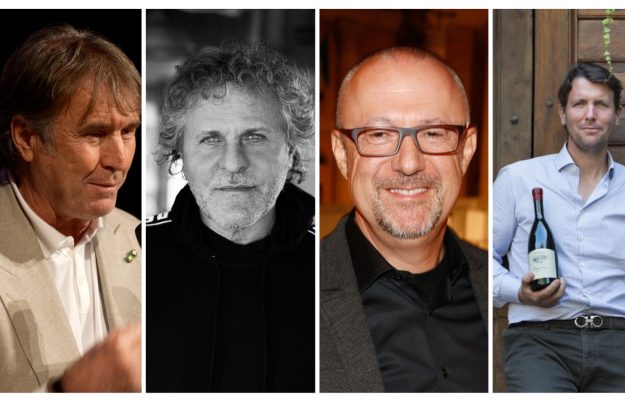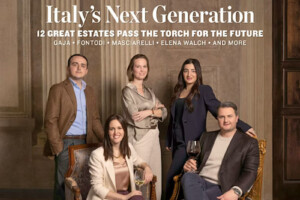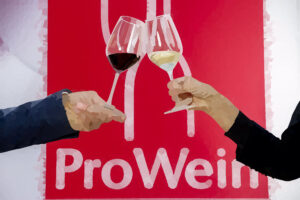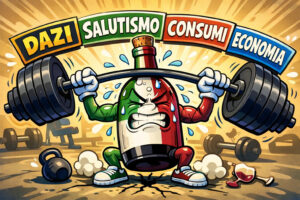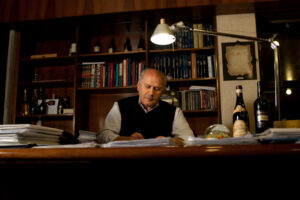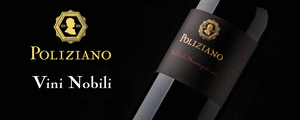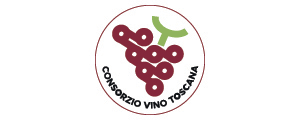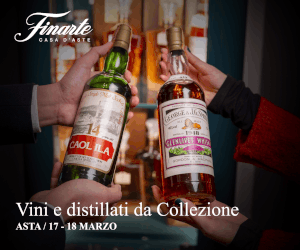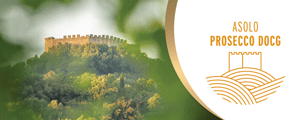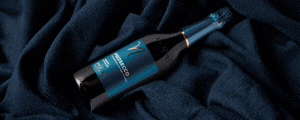The richest man in the world, at least for the moment, is Bernard Arnault, president and CEO Lvmh - Moët Hennessy Louis Vuitton, the largest international luxury group, capable of bringing together some of the most prestigious brands in fashion and wine. An encounter that is anything but casual, essentially revolving around the concept of luxury, within a very precise entrepreneurial project, which is enriched with new brands every year. In Italy, where both haute couture - with a turnover of 102 billion euros in 2022 - and wine - capable of almost 8 billion euros in exports - are highly competitive sectors, nothing like this exists yet.
Something, however, is changing. The Made in Italy fashion world, for some time now, has been showing some interest in that of wine, capable of making its way into the fine wine segment that has always been the almost exclusive fiefdom of the greats of France. The connection is not accidental, but the forms, motivations, and economic and cultural backgrounds of the entrepreneurial stories are far removed from the example from which we started. For the big names in fashion met by WineNews - Brunello Cucinelli, Renzo Rosso, Sandro Veronesi, and Salvatore Ferragamo - wine is not a trivial line of business.
However many points of contact exist with fashion, starting with quality and exclusivity, peculiar to every luxury product, wine is first and foremost a way to reconnect with the land, with one’s roots. With fashion, the dialogue is constant, in an exchange in which, when it comes to communication, marketing, internationalization and the ability to stay on the markets, Italian wine, with all its history and its cultural and social bearing, shows all its limits. It still has a long way to go, ahead of it, and a lot to learn precisely from fashion.
For Brunello Cucinelli, the “king of cashmere” who, from Solomeo, in Umbria, has conquered the world by becoming one of Italy’s most enlightened entrepreneurs, a theorist of “Humanistic Capitalism”, it is precisely from labor that change must begin, in the factory as well as in the winery. “In the future, it will not be difficult to find those who sell products, but those who produce them, and this also applies to wine. I am referring to workers, not managers or employees, who have moral and economic dignity. The issue of the worker is a big one: in our factories we are used to not having windows, for fear that they will waste our time. Workplaces must change, because you cannot work 8 hours without seeing the sky, and salaries must increase”, Brunello Cucinelli tells WineNews.
“Wine and oil are two great products, as ancient as creation, representing the earth, as well as clothing, which was a relevant aspect even in the time of Emperor Hadrian. Even if we drink very little, at the table the glass of wine - strictly glass - must always be present, it is part of our culture, without wine as a companion it is not a great meal”, Cucinelli recalls, then stressing how that of the balance between territory, tourism and quality of productions is “a great theme. After the pandemic, the number of tourists is huge, and the risk of losing the spirituality of certain places is obvious. We must try to focus on exclusivity, craftsmanship, quality and custodianship of the territory. In Umbria, we still find a healthy, peaceful and spiritual atmosphere, a balanced rhythm of life”.
Spirituality, however, is not enough for a product, and of course, a wine, to be successful: it takes the right “dress”. “When I was a boy, I was very fascinated by the packaging of Japanese products, which have always had a unique taste and refinement, and even today I give a lot of importance to the form-it makes all the difference. A beautiful table, set well, a bottle of wine with a beautiful label, as the French teach us, makes a difference. Dostoevsky said that beauty will save the world, for Kant beauty is a symbol of moral good, I simply believe that a well-groomed and pretty thing always makes a difference, in any situation”, adds the king of cashmere.
In Cucinelli’s economic galaxy, however, wine still plays a marginal role, however symbolically relevant. “On an economic level, if we didn't sell more pullovers we wouldn’t make wine. But I come from the land, I was a farmer until I was 15, and as Xenophanes said everything comes from the land. I’m attached to the land, I like making wine, and I’m happy that it can be called contemporary wine: I’m not a great expert, but I think everything should be contemporary, even capitalism and, of course, clothing, which if it wasn’t contemporary wouldn't be on the market”, Brunello Cucinelli concludes.
From cashmere to denim, different styles, on the catwalk and in the winery, Renzo Rosso in wine has bet big. At first, with Diesel Farm, a stone’s throw from his Vicenza, then by investing in established realities such as Benanti in Sicily, Masi in Valpolicella and Josetta Saffirio in Langa. The idea, in the not at all distant future, is to arrive even in Montalcino, the land of Brunello, and “create the first Italian luxury wine holding company”, as he told WineNews. Following, on a smaller scale, precisely the example of the big luxury groups of France.
“Wine represents something special, it ties in with my origins: I was born on a farm, and as a child I used to go inside the biggest barrels to clean them with my father. In my entrepreneurial career, the moment came when I could buy my own winery, and it was a beautiful moment. I started making wine right away, with winemaker Roberto Cipresso”, Renzo Rosso recalls. Today we have come to do something special, bringing the experience gained in fashion-from marketing to communication to the ability to make a system-into the wine sector, looking at the world of luxury, where Italian wine has great margins for growth: I want to create the first Italian luxury wine holding company”.
In the belief, always reiterated by Renzo Rosso, that “from fashion, wine can learn, starting with how to present itself to the market. Fashion has managed to bring its signs to the most important streets in the world, the same thing we should do with wine, because it is nice to sit at the table with a friend and a great bottle, just like having a designer bag. Wine, in the future, will increasingly be something special”. Quality thus becomes a conditio sine qua non, which passes through a choice that is now a must: organic, which “represents the modern way of making a product, in wine as in fashion, where the focus is on sustainable production and recycled fabrics. We need to produce less but with greater quality, avoiding waste. This is where well-being comes from, from quality consumption that avoids CO2 emissions and waste of raw materials, to create a world that is better for future generations”, explains Renzo Rosso.
Another crucial aspect, in order to grow in the world, is the ability to know how to open up and how to communicate, and in this “wine is still far behind, it is a closed world, made up of insiders, with a transformation yet to be completed. It is good that purity and quality have been preserved, but if we want to bring the sector to be really special we need to work on communication and positioning, aspects that few people are working on. The storytelling of wine as a medium of terroir is fascinating, and telling how a bottle is created, the relationship with nature and the land, is beautiful: it is what the consumer needs to know and it is what makes the product grow. Widening the view, however, it is good for wine to meet other areas as well, such as fashion, art, entertainment, and in general everything that creates added value, one thing lends a hand to the other”, adds the iconic blue jeans entrepreneur.
An arduous path, however, to say the least, that of Sandro Veronesi. At the head of Italy’s third-largest fashion group, Calzedonia Holding, which has reached a turnover of 2.5 billion euros (data from Area Studi Mediobanca), in 2012 he thought it a good idea to open a chain of wine shops, Signorvino, which, from Verona, quickly conquered Italy, and now looks to the world, with upcoming openings planned in Paris and Prague. But it doesn’t end there, because in addition to selling it - a lot and well, judging by the 55 million euros billed in 2022 - Sandro Veronesi has also thought well of investing in the production side, with La Giuva, in Valpolicella, and Tenimenti del Leone in Lazio, but also in Sardinia and Trentodoc.
“Wine is tradition, fashion is continuous innovation, a fusion of the two, to achieve the best in both fields, would be ideal”, says Sandro Veronesi. “And that is then what we are trying to do, which is to bring the experience of the fashion world to the wine world: a breath of modernity and freshness in the way of making, selling and communicating. In this sense, Signorvino wants to be an environment where wine is made accessible, especially to a young and global audience, with a fascinating but also simple discourse. It is a work carried out by our wine specialists, who have the ability to tell about wine in a new way. Wine is not just a taste of something, but it is an experience that, in the encounter with art, culture and surroundings, can lead to greater enjoyment. There is a great desire for Italianness in the world, and wine alone, limited to the glass, is not enough. It needs everything around it, starting with the territory from which it comes, which is a fundamental peculiarity”, explains “Mr. Calzedonia”.
Finally, the case history of Salvatore Ferragamo, nephew, and namesake, of the great fashion designer, who has preferred wine to fashion, produced at Il Borro, in Valdarno, once a hunting lodge, which since 1993 has become an all-round company devoted to the highest quality, from wine, produced from 45 hectares of vines, to catering, from hospitality to livestock. “I think the link between wine and fashion passes first and foremost through attention to detail and attention to quality”, says Salvatore Ferragamo. “Aspects that, speaking of wine, we find right from the selection of clones that we have made at the Borro, passing through the production and then wine-making processes, which are very sophisticated, almost maniacal. It is the same care we have in the choice of barrels and in marketing, but another aspect that wine and fashion have in common is creativity: Il Borro is in the Valdarno, a denomination that leaves us ample room for maneuver, and therefore freedom”.
“There is a very strong connection between Il Borro and the Ferragamo brand”, Salvatore Ferragamo recounts further. “I am named after my grandfather, Salvatore Ferragamo, which is why the connection is immediate. Fashion is a different industry, every six months a new collection is launched, while in the world of wine it is Mother Nature who decides the “collection”, just one per year, and she reserves us better, worse, or simply different vintages. Nature, however, also plays an important role in fashion, think of silk, and how nature offers incredible cues for creativity”, adds the head of Il Borro’s wine business.
Copyright © 2000/2026
Contatti: info@winenews.it
Seguici anche su Twitter: @WineNewsIt
Seguici anche su Facebook: @winenewsit
Questo articolo è tratto dall'archivio di WineNews - Tutti i diritti riservati - Copyright © 2000/2026










